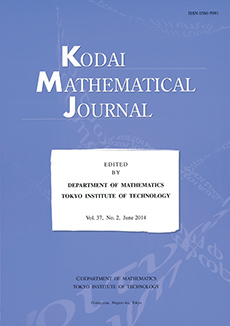Abstract
Given k ≥ 2 let α1, ..., αk be transcendental numbers such that α1, ..., αk–1 are algebraically independent over Q and αk $\in$ Q(α1, ..., αk–1), but αk, ≠ (aαi + c)/b for some i $\in$ {1, ..., k – 1} and some a, b $\in$ N, c $\in$ Z satisfying gcd(a,b) = 1. We prove that then there exists a nonnegative integer q such that the set of so-called Dirichlet exponents log(n + αj, where n runs through the set of all nonnegative integers for j = 1, ..., k – 1 and n = q, q + 1, q + 2, ... for j = k, is linearly independent over Q. As an application we obtain a joint universality theorem for corresponding Hurwitz zeta functions ζ(s, α1), ..., ζ(s, αk) in the strip {s $\in$ C: 1/2 < $\Re$(s) < 1}. In our approach we follow a recent result of Mishou who analyzed the case k = 2.
Citation
Artūras Dubickas. "On the linear independence of the set of Dirichlet exponents." Kodai Math. J. 35 (3) 642 - 651, October 2012. https://doi.org/10.2996/kmj/1352985459
Information





